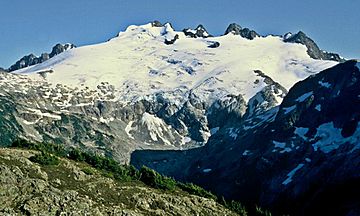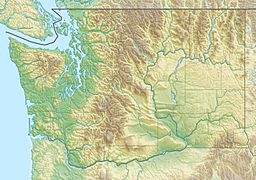Mount Challenger (Washington) facts for kids
Quick facts for kids Mount Challenger |
|
|---|---|
 |
|
| Highest point | |
| Elevation | 8,207 ft (2,501 m) |
| Prominence | 567 ft (173 m) |
| Geography | |
| Location | Whatcom County, Washington, U.S. |
| Parent range | Cascade Range |
| Topo map | USGS Mount Challenger |
| Climbing | |
| Easiest route | class 4 |
Mount Challenger is a tall mountain in North Cascades National Park in Washington, USA. It stands about 8,207 feet (2,501 m) high. This mountain is quite hard to reach because it's in a very remote area.
One popular way to climb to the top is by going up the Challenger Glacier. This glacier is on the northern side of the mountain. Mount Challenger is also one of the highest peaks in the group of mountains called the Picket Range.
Weather at Mount Challenger
Mount Challenger is in a special weather area called the "marine west coast climate zone." This means it gets a lot of rain and snow. This type of weather is common in western North America.
Most of the weather systems start over the Pacific Ocean. They then travel northeast towards the Cascade Mountains. When these weather systems hit the tall peaks of the North Cascades, the air is forced to rise.
As the air goes higher, it cools down. This causes the moisture in the air to turn into rain or snowfall. Because of this, the western side of the North Cascades gets a lot of precipitation. This is especially true during the winter months, when heavy snow often falls.
The climate here is mild because it's close to the Pacific Ocean. Temperatures rarely drop below 0 °F (−18 °C) (which is −18 °C (0 °F)) or go above 80 °F (27 °C) (which is 27 °C (81 °F)).
In winter, the sky is usually cloudy. But in summer, big high-pressure systems form over the Pacific Ocean. These systems often bring clear skies with little to no clouds. Because the ocean affects the weather so much, the snow here tends to be wet and heavy. This can make the risk of avalanches higher.
 | Precious Adams |
 | Lauren Anderson |
 | Janet Collins |



